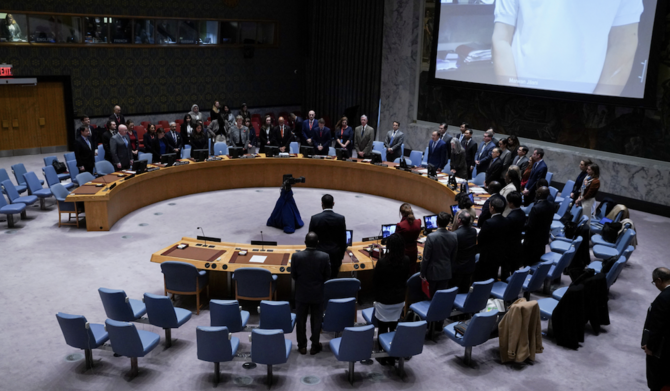
- ARAB NEWS
- 28 Apr 2024

In a TV interview during the UN General Assembly last September, Secretary-General Antonio Guterres said power, especially at the Security Council, was not in his hands but in those of the member states. What he had was a voice, and convening power.
At that time the war in Ukraine was the center of attention, and he commented on his inability to intervene to stop it. He described the situation at the Security Council as a “paralysis of political decision”: the geopolitical divide had paralyzed the ability to take action.
This wasn’t the first time the Security Council had failed to act to protect civilians and prevent wars and atrocities, but the war in Gaza that erupted a few weeks later has made that paralysis more severe and glaringly obvious. It clearly demonstrated that the Security Council was not living up to its primary responsibility, which is to maintain international peace and security. Member states individually have the power, particularly the permanent five, but they intervene only when it is in their interests, regardless of the killing, mayhem and suffering of the innocent.
This raises the question, what is the purpose of the Security Council?
At the time of his interview, Guterres was proud of the work of the UN’s humanitarian sector. In Gaza, even that has been inefficient and inadequate because of Israel’s refusal to allow humanitarian aid into the enclave, which had already been under Israeli blockade for 16 years. Even UN staff and facilities have been targeted, resulting in the deaths in just a few months of more UN personnel, not to mention journalists, than in any other conflict. Meanwhile, Palestinians in Gaza are being killed, forcibly evicted, displaced and left to suffer homelessness, starvation, thirst, disease, and now the cold weather as the whole enclave has been reduced to rubble and rendered uninhabitable — all in the eyes and ears of the world, including the Security Council.
For many who had some hope or belief in the international system, the disappointment and disillusion are great. The already weak, disenfranchised and powerless now feel helpless and abandoned.
However, there are still means to stop this vengeful, ferocious, inhumane aggression on Gaza and bringing the perpetrators to justice. South Africa has filed an application at the International Court of Justice in The Hague accusing Israel of breaching the 1948 Genocide Convention. The court is the UN’s principal judiciary organ. Its role is to settle, in accordance with international law, legal disputes submitted to it by states, and to give advisory opinions on legal questions referred to it by UN entities and agencies.
After two days of hearings, the world now waits to see how much power the court actually has. In its request, South Africa asked for provisional measures to “protect against further, severe and irreparable harm to the rights of the Palestinian people under the Genocide Convention” and “ensure Israel’s compliance with its obligations under the Genocide Convention not to engage in genocide, and to prevent and to punish genocide.”
South Africa has filed an application at the International Court of Justice in The Hague accusing Israel of breaching the 1948 Genocide Convention.
Maha Akeel
Will politics and power influence how the case moves forward? What are the expectations? Who will stand with which side? And who will enforce any ruling made by the court?
The Gaza war has revealed many things: the double standards of the West, the hypocrisy, the dominance, and the hegemony. Human rights and international law seem to apply only to certain peoples. Freedom of expression and of the press are paramount only if they conform and align with those who define and determine their boundaries.
Western countries, especially the US, have lost much of their credibility and moral leadership. Perhaps one of the main revelations of this war has been how much power and influence the Israeli lobby has on US politics and society. If you want to have a long and successful political career, if you want to continue working in Hollywood, if you want to keep your media job and academic standing, you need to be in the good books of “you know who” or you will be discredited and destroyed by the label of antisemitism, or find yourself entangled in other serious accusations.
Any country lucky enough to be in the orbit of protection of one of the five permanent members of the Security Council is assured of immunity from persecution and the freedom to act with impunity. Otherwise, it can expect to be held accountable and responsible for violating international laws and obligations.
Perhaps this is why armed non-state actors are finding more space to act, with diplomatic and peaceful means blocked. They are taking charge, disrupting and challenging the status quo.
This is not a good sign for peace and security.
In his TV interview Guterres expressed frustration at the high level of division and unpredictability among the Security Council members, which undermined trust in the UN’s peacemaking and peacekeeping efforts. The outdated and dysfunctional state of affairs at the Security Council puts the whole world at risk of increasing violence and humanitarian suffering as people become more vulnerable to crises and disasters.
It is absolutely time to reform the council’s structure, privileges and role. Leaving things as they are will not be conducive to peace and security, as more actors emerge with the means of disrupting and challenging the dominance and hegemony of those in power, creating new possibilities, environments and engagements that may lead to more crises, war and suffering.
• Maha Akeel is a Saudi expert in communications, social development, and international relations. She is a member of the UN’s Senior Women Talent Pipeline. X: @MahaAkeel1